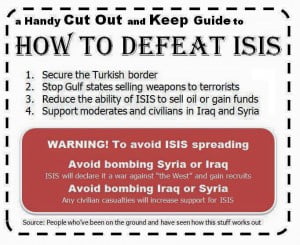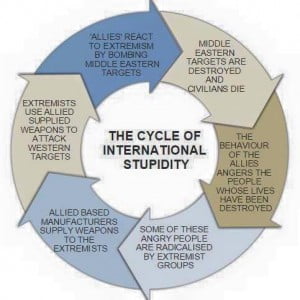Should we bomb ISIS in Syria?
 I hesitate to annotate on this, every bit the issues are so circuitous that it seems incommunicable to offer whatsoever clear opinion. But discussion and reflection propose that we cannot ignore the following points.
I hesitate to annotate on this, every bit the issues are so circuitous that it seems incommunicable to offer whatsoever clear opinion. But discussion and reflection propose that we cannot ignore the following points.
1. The British public do non back up it
The Contained reports research by the Daily Mirror:
The survey conducted for the Daily Mirror past Survation showed 59 per cent of people believed sending warplanes to bomb key Isis targets in the war-torn country will increase the adventure of terrorist attacks in the UK.
While 48 per cent of people said they backed air raids on the extremists, merely 30 per cent want Britain to stay away and a further 21 per cent are undecided.
Information technology is interesting to reverberate why politicians are more 'hawkish' on this than the public in general. And information technology highlights that Jeremy Corbyn is right to ask why Labour MPs are not reflecting the views of the Labour Party membership. Is it because, like the Conservatives, they take become a political class increasingly out of touch with the electorate?
two. The Prime number Minister'southward reasons are unconvincing
Yous can read the PM's conference to the Foreign Affairs Select Commission for yourself. It does not await very convincing. My skillful friend Peter Caput comments:
Well I've read the Prime number Minister's Memorandum to the Foreign Affairs Select Commission setting out the grounds for air-strikes against ISIL in Syria and I was not persuaded. The naive faith in "precision bombing", the myth that 70,000 Syrian moderates will step up and take command, the entreatment to Iraq as an exemplar of good practice, are bad plenty; but the belief that air strikes tin exist regarded as legitimate acts of national self-defense force and that they tin can defeat ISIL are not supported past show or statement. And at several points the main argument is "nosotros don't want to be left out of the gang" because that would damage our international esteem. Not practiced plenty. I'm non voting for this.
3. Jeremy Corbyn asks some of import questions
Corbyn's letter to his MPs is fairly short and to the point. The core of it is that Cameron has not really answered the questions asked of him:
Our first priority must be the security of Great britain and the condom of the British people. The issue now is whether what the Prime Minister is proposing strengthens, or undermines, our national security.
I do non believe that the Prime Minister today made a disarming case that extending UK bombing to Syria would meet that crucial test. Nor did it satisfactorily answer the questions raised by us and the Foreign Affairs Select Committee.
In item, the Prime Minister did not set up out a coherent strategy, coordinated through the Un, for the defeat of ISIS. Nor has he been able to explain what credible and acceptable ground forces could retake and concord territory freed from ISIS control by an intensified air entrada.
I recall it is a bully shame that BBC coverage has mostly focussed on what is happening in the Parliamentary Labour Political party, and Corbyns's leadership—rather than the questions of substance which demand to be addressed.
Matthew Parris, writing in The Times (sadly behind the paywall) appears to agree.
Amazingly, Corbyn is right. The hawks but want to bring together a scrap with their mates and haven't a inkling what happens afterwards.
'If not now, when?" asked the prime minister this week: a question that has surely preceded some of the silliest decisions in history. Information technology could take been asked before Iraq. It could have been asked before Transitional islamic state of afghanistan or Great socialist people's libyan arab jamahiriya, or Suez. Information technology was probably asked before the Charge of the Light Brigade. At that place is no correct time for an unwise determination.
 4. Many Syrians practise not want it
4. Many Syrians practise not want it
I recently read a letter from Syrian community leaders in the UK urging that bombing should not be stepped upwardly. (If y'all tin locate it, please permit me know.) It is not hard to see why. Bombing destroys infrastructure, so that poverty and frustration increase, which in turn just functions as a breeding basis for farther resentment and extremism. Civilian casualties are bound to result. And for many in Syrian arab republic, ISIS has been welcomed because they received worse treatment at the hands of Assad.
The letter from the End the War coalition sets out the lessons from previous conflicts.
The current rush to bomb Syria post-obit the terrible events in Paris risks a dangerous escalation which will inflame the war at that place and increase bitterness against the west. The United states of america has been bombing Isis for a year and admits that Isis is as stiff every bit always and has continued recruiting.
The experience of the wars in Afghanistan, Iraq and Libya shows that western military interventions lead to large-scale casualties, devastating devastation and huge flows of refugees. Far from tackling terrorism, the last 14 years of war have seen massively increased jihadi terrorist organisations around the globe.
Andrew Bacevich, a former United states Colonel, highlights why bombing would be so counter-productive in the longer term.
The threat posed past terrorism is but symptomatic of larger underlying problems. Crush Isis, whether by bombing or employing boots on the ground, and those issues will nonetheless persist. A new Isis, under a different proper noun simply probably flight the same banner, will appear in its place, Much as Isis itself emerged from the ashes of Al Qaeda in Republic of iraq.
5. Western coin is funding ISIS
NATO member Turkey has been a long-term funder of both Al Qaeda and ISIS.
Information technology might seem outrageous to suggest that a Nato member like Turkey would in any style support an system that murders western civilians in cold claret. That would exist like a Nato fellow member supporting al-Qaida. But in fact there is reason to believe that Erdo?an'southward government does back up the Syrian co-operative of al-Qaida (Jabhat al-Nusra) too, along with any number of other rebel groups that share its conservative Islamist ideology. The Institute for the Written report of Human being Rights at Columbia University has compiled a long list of testify of Turkish back up for Isis in Syria.
The son of Turkey'due south President appears to be directly involved in this funding.
A much more than effective way of defeating ISIS would exist to persuade Turkey to allow Kurdish forces freedom to act.
How could Isis be eliminated? In the region, everyone knows. All it would really take would be to unleash the largely Kurdish forces of the YPG (Democratic Matrimony party) in Syria, and PKK (Kurdistan Workers' political party) guerillas in Iraq and Turkey. These are, currently, the chief forces actually fighting Isis on the ground. They accept proved extraordinarily militarily effective and oppose every aspect of Isis's reactionary credo.
Only of course support for ISIS as well essentially comes from Saudi Arabia—whose coin in turn comes from Western countries ownership its oil—forth with State of kuwait and Qatar, all of whom have received significant support from the UK Government. In fact, the growth of ISIS might well have been a long-term strategic goal of the Saudis.
half-dozen. Western arms manufacturers are fuelling a new arms race in the region.
There has been a massive escalation of arms sales to the region, with Great britain leading the manner, forth with the US, Canada and France. In response, Russian federation has besides stepped upward its sales.
Given the unprecedented levels of weapon sales by the west (including the US, Canada and the UK) to the mainly Sunni Gulf states, Vladimir Putin's conclusion concluding week to allow the controversial commitment of South-300 anti-aircraft missiles to Islamic republic of iran – voluntarily blocked by Russian federation since 2010 – seems likely to advance the proliferation.
That will run into agreed arms sales to the top five purchasers in the region – Saudi arabia, the United Arab Emirates, People's democratic republic of algeria, Egypt and Iraq – surge this year to more than than $18bn, up from $12bn final year.
This adds to the merchandise in illicit artillery left over from conflict in the Balkans—and the U.s.a. weapons supplied to the Iraqi regular army that have been captured by ISIS.
vii. The Christian tradition of pacifism
In that location are many important theological issues raised by all this. What are the ethics of supporting a war which benefits 1'due south own economy by selling arms? Where is the integrity in supporting regimes who are in flagrant alienation of human rights? Where is the integrity in working with countries which are conspicuously supporting terrorist organisations which are threatening our national security? How tin politicians brand responsible decisions when looking hawkish consistently boosts ane'south poll ratings?
Underneath information technology all is the stiff Christian tradition of rejection of state of war as a fashion of resolving disharmonize. I found it challenging to be preaching on Daniel seven this morning time. Nearly scholars believe that though Daniel is written about events in the sixth century BCE, it was writtenfor a crisis in the second century—the desecration of the Jewish Temple by Antiochus Iv Epiphanes in 167 BCE. An alternative account can be found in the business relationship of Judas Maccabeus and his brothers. They opposed Antiochus by forcefulness—but their books did not find their manner into the canon of scripture. Instead, we have Daniel, whose message is to expect for God's deliverance rather than resist by force.
This doesn't offer an easy solution—but at that place seem to me to be enough important questions that demand a good respond before nosotros go to war once more.
Follow me on Twitter @psephizo.Similar my page on Facebook.
Much of my work is done on a freelance basis. If y'all accept valued this post, would you lot consideraltruistic £1.20 a month to back up the production of this blog?
If y'all enjoyed this, do share it on social media (Facebook or Twitter) using the buttons on the left. Follow me on Twitter @psephizo. Like my folio on Facebook.
Much of my work is done on a freelance basis. If you have valued this post, you lot can make a single or repeat donation through PayPal:
Comments policy: Proficient comments that engage with the content of the post, and share in respectful fence, can add real value. Seek start to understand, so to be understood. Make the almost charitable construal of the views of others and seek to acquire from their perspectives. Don't view debate as a conflict to win; accost the statement rather than tackling the person.
robinsonatephy1951.blogspot.com
Source: https://www.psephizo.com/life-ministry/should-we-bomb-isis-in-syria/
0 Response to "Should we bomb ISIS in Syria?"
Postar um comentário